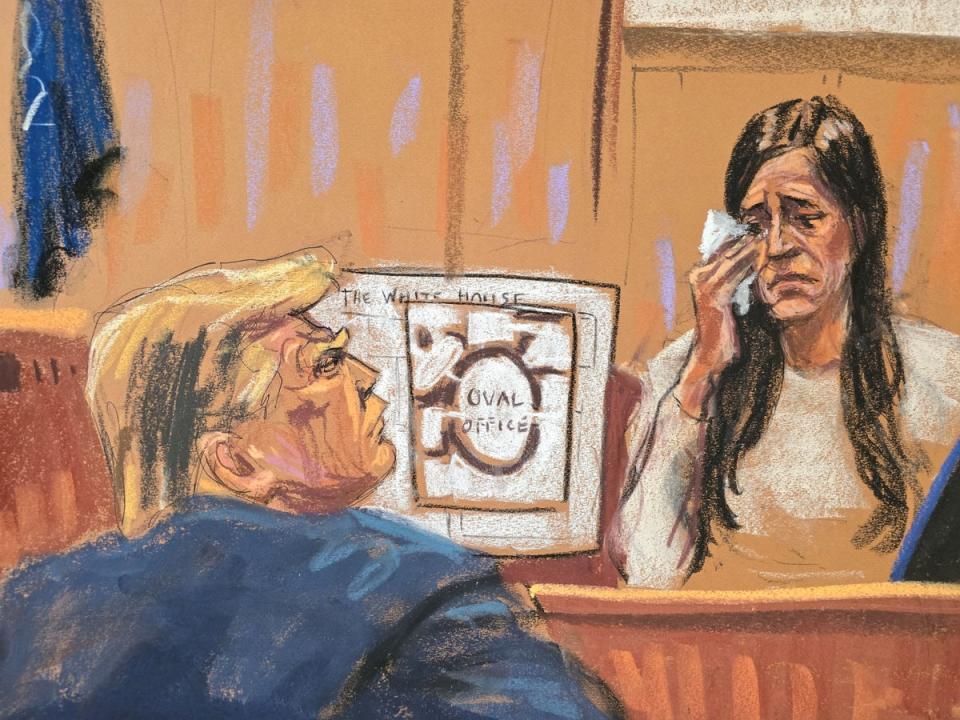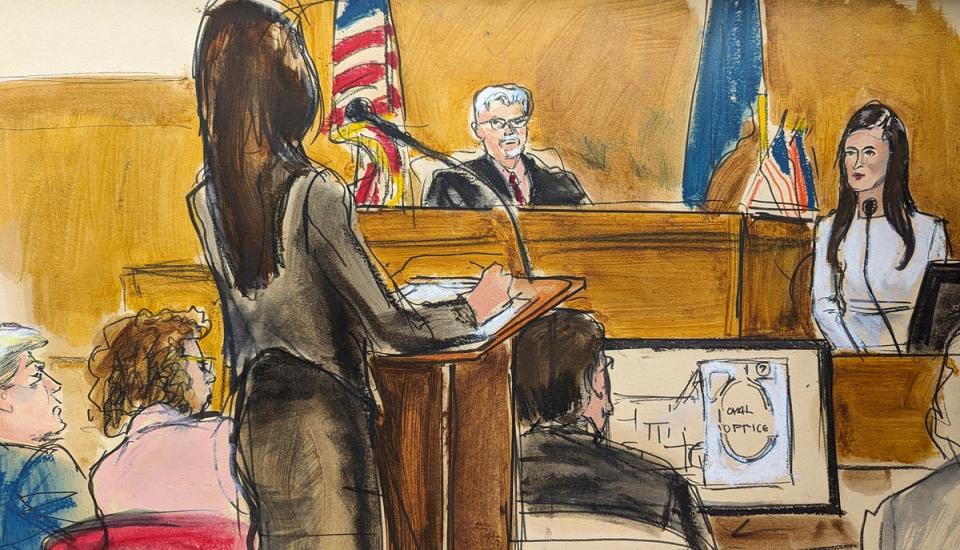Ex-White House ‘gatekeeper’ cries on stand as she testifies about Trump firing her
One of Donald Trump’s chief White House aides sobbed on the witness stand while testifying at his hush money trial as she remembered her former boss firing her from his administration after what she called a “regretful youthful indiscretion”.
Madeleine Westerhout is one of two key Trump administration figures who have testified in his case in Manhattan, where the former president is charged with falsifying business records as part of an alleged cover up to keep the story of a sexual encounter with Stormy Daniels hidden from voters in the lead up to the 2016 presidential election.
“I feel like I learned a lot from that experience and I have learned a lot since then,” said Ms Westerhout, who dabbed her eyes with a tissue during her testimony on Thursday.
Ms Westerhout, who served as Mr Trump’s executive assistant in the first few years of his administration, was reportedly fired in August 2019 after telling reporters that she has a better relationship with Mr Trump than his daughters.
“It was too bad,” Mr Trump said at the time. He called her a “very good person” and he “wished her well.”
She later wrote about her experience at the White House in the book Off the Record: My Dream Job at the White House, How I Lost It, and What I Learned.
On Thursday, as her voice was breaking, she said she wrote the book to “share with the American people that the man that I got to know… I don’t think he’s treated fairly and I wanted to tell that story.”

Prosecutors have relied on testimony from former Trump Organization employees to show how cheques for his then attorney Michael Cohen were cut from Trump Tower in New York, then sent via FedEx to Washington DC, where Mr Trump would sign them from the White House.
Those cheques included monthly instalments to Cohen to reimburse him for the $130,000 he wired to Ms Daniels’ attorney as part of a nondisclosure agreement that would ensure her silence about her alleged sexual encounter with Mr Trump in 2006.
On Thursday, Ms Westerhout’s testimony detailed how FedEx envelopes would be mailed to Mr Trump’s bodyguard’s home address in Washington DC, and then handed over to Ms Westerhaut at the White House.
“The cheques came in a FedEx envelope, so I opened the envelope and inside was a manila folder with a stack of cheques,” she said.
She then gave those cheques to Mr Trump to sign.
“I don’t recall how frequently but it was consistent. Maybe twice a month,” she said.
Sometimes there was one, and “sometimes a stack half an inch thick,” she said.
Invoices, pay stubs, ledger entries and company accounting software showed that those cheques to Cohen were labelled as “legal expenses,” which Manhattan prosecutors argue concealed the true nature of the payments, which was part of a so-called hush money scheme to unlawfully influence the 2016 election by keeping potentially politically compromising stories away from voters.
That scheme became more urgent after the release of a 2005 tape that captured Mr Trump bragging about grabbing women’s genitals.
The release of the Access Hollywood tape prompted Republican officials with the Republican National Committee to have “conversations” about how, if necessary, they could “replace him as a candidate if it came to that,” according to Ms Westerhout, who worked for the RNC before she was brought into the administration in 2017.

The tape did not impact Mr Trump’s relationship with his wife Melania, according to Ms Westerhout.
“I believe they have a relationship of mutual respect. I just found their relationship really special, and he really cares a lot about her opinion,” she said.
Under cross examination from Mr Trump’s attorneys, she said Mr Trump “never once made me feel like I didn’t belong there” and was “a really good boss.”
“I just found him very enjoyable to work for,” she said.


